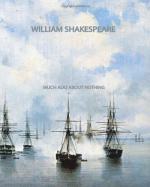|
|
Much Ado about Nothing Author/Context
William Shakespeare was born on either the 22nd or 23rd of April, 1564 in Stratford-on-Avon, a small British town outside of London, to parents Mary Arden and John Shakespeare. He was educated at the King's Free School of Stratford, where he studied the Bible and Latin. He married Anne Hathaway at age 18. After his marriage to this older woman, writing poetry became his profession to support his family. William and Anne had a daughter named Susanna and twins named Judith and Hamnet. Shakespeare began writing and finding different groups to perform his work, including the Admiral's Men, The Queen's Men, Pembroke's Men, and Lord Strange's Men. However, the Chamberlain's Men was the group of players in which he composed, produced, and performed many of his plays in the now-famous Globe Theater. He was compared to contemporary "scholars" such as Ben Jonson and Christopher Marlowe, the former would become one of his greatest actors, and the latter, one of his greatest playwriting rivals.
Shakespeare is argued to have produced an incredibly large library of work, including 38 plays and countless sonnets. His plays are divided into four main sections: the Histories, the Tragedies, the Comedies, and the Romances. Much Ado About Nothing falls under the category of Comedy. His work has also been consistently revisited countless times by the same artistic medium because it is said to be timeless. Shakespeare's topics are about love, murder, jealousy, miscommunication, chastity, history, and even magic. Much Ado About Nothing encompasses the classic elements of Shakespeare's comedies. It begins with the idea of marriage, encompasses miscommunication between the characters, contains a single villain, concludes with happy, resolved marriages, and proudly displays a comic relief character. Most of Shakespeare's plays use this character of the clown, jester, or commoner to spark slapstick laughter. Dogberry, his sidekick Verges, and the night watchmen qualify as this "character" in Much Ado About Nothing. Also, these lower-class characters speak in prose, not in poetry (iambic pentameter), like the rest of Shakespeare's characters.
This play is a combination of Shakespeare's originality in comedy and his research of other literature. The plot between the witty Beatrice and Benedick is unique to Shakespeare and is sometimes seen as a study of contemporary English character. The character of Dogberry, in all his senselessness and absurdity, is another concoction of the Bard. However, his melodramatic love story between Hero and Claudio almost destroyed by an evil villain, is common in the literature of many countries during his day. Like these two lovers' story, many critics believe that Shakespeare used other authors' plots in his own work. While the plot between the lovers, Claudio and Hero, is supposed to take center stage, it is Shakespeare's original duo of Beatrice and Benedick that wins the hearts in the audience. "Scoffers at love, yet magnetized to each other, sparring at every turn, Benedick and Beatrice are the readiest victims for the Nemesis of Comedy. They are Biron and Rosaline of Love's Labour's Lost freed and perfected on a higher plane. Beatrice, though less warm and radiant than some of Shakespeare's women, is one of the most real and lovable of them all."
Much Ado About Nothing is assumed to have been written in 1599, a time in which Shakespeare was extremely busy and productive in terms of playwriting. It remains one of the most enjoyed Shakespearean comedies today and aside from being staged throughout the centuries, has been made a film by Kenneth Branaugh and an opera by Hector Berlioz called Beatrice and Benedick.
Bibliography
Chambers, William. A Short Life of Shakespeare with the Sources. London: Oxford University Press, 1933.
Pearson, Hesketh. A Life of Shakespeare. New York: Walker and Company, 1961.
Shakespeare, William. Much Ado About Nothing. New York: Quality Paperback Book Club, 1993.
Shakespeare, William. Complete Plays and Poems. Ed, William Allan Neilson. Cambridge: The Riverside Press Company, 1942.




